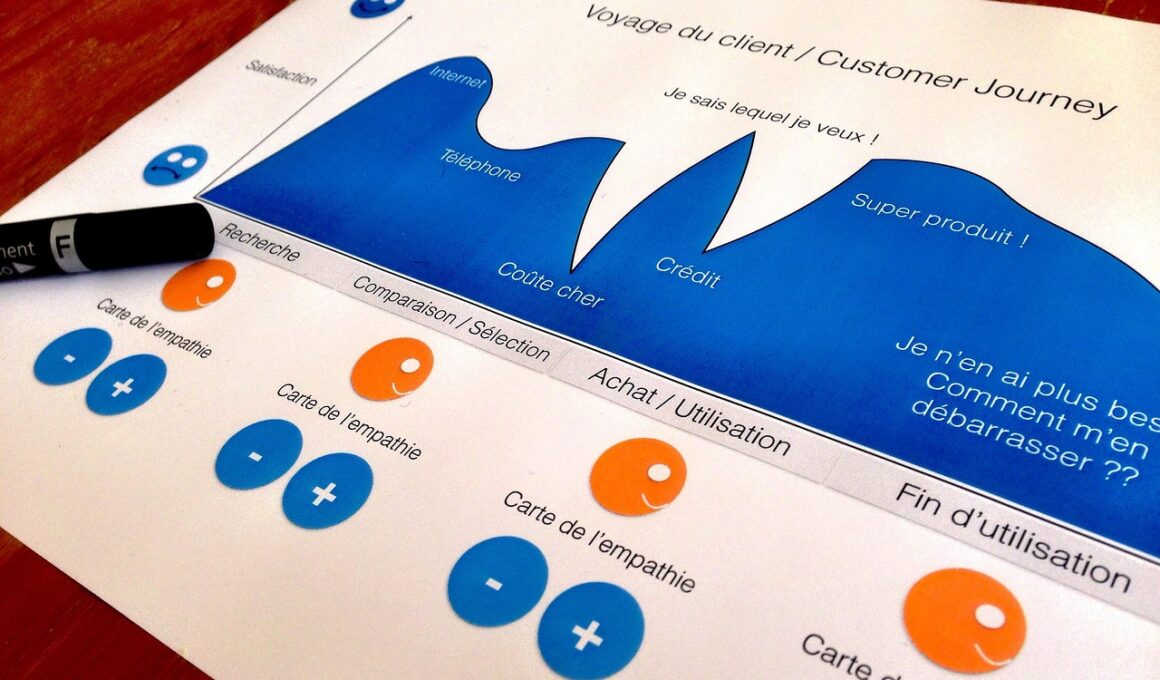How Chatbots Improve Customer Journey Mapping in Marketing
In the evolving landscape of customer relationship management (CRM), chatbots have emerged as a transformative tool in enhancing customer journey mapping. Utilizing chatbots can significantly elevate the way businesses interact with customers, ensuring tailored experiences that cater to their preferences and behaviors. These AI-driven assistants offer real-time communication and support, providing customers with instant access to information and solutions. By analyzing customer interactions, chatbots can gather valuable data that help businesses understand user behavior, preferences, and pain points. This insight aids in creating a more comprehensive customer journey map, allowing businesses to design their marketing strategies effectively. Furthermore, chatbots streamline communication, enabling quick responses to inquiries, thereby improving customer satisfaction. Their ability to engage in personalized conversations ensures that customers feel valued and understood. In an age where customer expectations are continually rising, implementing chatbots can lead to enhanced brand loyalty and trust. Additionally, chatbots can operate 24/7, providing continuous support without interruption, ensuring that customer needs are always met at any time. This reliability further strengthens the overall customer experience, making chatbots invaluable in CRM.
The role of chatbots in CRM extends beyond simple customer support. Leveraging advanced machine learning algorithms, chatbots can predict customer behavior and needs by analyzing previous interactions. This predictive capability allows businesses to proactively address potential issues and offer personalized recommendations. When mapping the customer journey, chatbots play a crucial role in identifying critical touchpoints where intervention may be needed. Through integration with CRM systems, chatbots can automate the collection of customer feedback, generating insights into satisfaction levels. Utilizing this data, organizations can make informed decisions to refine their marketing strategies, ensuring alignment with customer desires. Moreover, chatbots can segment customer data based on various criteria, such as demographics, purchase history, or preferences. By doing so, businesses can create tailored marketing campaigns that resonate with specific customer segments. This targeted approach not only enhances customer engagement but also improves conversion rates. As businesses harness the power of chatbots, they can create dynamic customer journeys that adapt in real-time. The seamless integration of chatbots into CRM platforms will transform the way companies connect with customers and enhance overall satisfaction.
Enhancing Engagement Through Personalization
Personalization is key to creating an engaging customer experience, and chatbots excel in this aspect within CRM. By harnessing data from customer interactions, these AI-driven tools can craft individualized responses tailored to each user’s needs. A chatbot can retain information about a customer’s previous inquiries or purchases, creating continuity and making customers feel recognized and valued. This personalized touch is vital for businesses aiming to foster strong relationships with their audience. Moreover, chatbots can help direct customers through each stage of their journey, from awareness to consideration and ultimately purchase. By guiding users with relevant information at the right time, chatbots can significantly reduce friction in the buying process. This proactive engagement can lead to increased conversion rates and decreased shopping cart abandonment. Additionally, chatbots can suggest products based on user preferences, enhancing up-sell and cross-sell opportunities. As engagements become more personalized, customers are more likely to respond positively. This strategy not only increases customer satisfaction but also drives revenue growth by encouraging repeat purchases. In essence, chatbots serve as crucial allies in the ongoing quest for customer-centric marketing.
The implementation of chatbots in CRM offers significant benefits for lead generation and nurturing processes. By providing immediate responses to inquiries, chatbots can help capture potential leads who may otherwise abandon the site due to delayed interactions. When integrated with lead generation forms, chatbots can engage prospects and gather critical information, enabling businesses to qualify leads more effectively. Additionally, chatbots can automate follow-up communications, ensuring that prospects receive timely information tailored to their interests. This level of automation empowers sales teams to focus on more qualified leads and efficient conversion strategies. Furthermore, by nurturing leads through personalized content and recommendations, chatbots can help guide prospects down the sales funnel. As leads interact with the chatbot and express their preferences, the chatbot collects data that enriches customer profiles, enabling businesses to craft tailored marketing communication. Consequently, prospects feel a stronger connection to the brand. The synergy between chatbots and CRM systems enhances the overall efficiency of lead management. In turn, streamlined processes lead to quicker decision-making and improved outcomes, making chatbots a vital component of successful marketing operations.
Automating Customer Feedback Collection
Customer feedback is essential for refining products and services, and chatbots streamline this process within CRM strategies. By incorporating feedback collection mechanisms into chatbot interactions, businesses can easily gather real-time insights from customers regarding their experiences. A chatbot can prompt users to share their thoughts immediately after a purchase or interaction, providing valuable information that can improve service delivery. Additionally, chatbots can deploy surveys and polls, allowing businesses to understand customer satisfaction levels and areas for improvement. These features enable companies to proactively address issues before they escalate. The ability to analyze feedback trends helps in identifying recurring problems and measuring customer sentiment effectively. As feedback is collected and analyzed, companies can adapt their strategies promptly. This continuous loop of feedback and enhancement boosts customer confidence when they see their inputs lead to tangible changes. Furthermore, chatbots can share survey results in real-time with relevant departments, fostering cross-collaboration. This process ensures a holistic understanding of customer needs across the organization. By automating feedback collection, chatbots provide businesses with rich data that drives strategic decisions.
Another essential aspect of chatbots in CRM lies in community building and social engagement. By facilitating direct communication with customers, chatbots create a sense of belonging within communities that surround brands. Customers appreciate businesses that actively engage with them, and chatbots can help foster this engagement by maintaining an ongoing conversation. These virtual assistants are always available, providing a space for customers to share experiences, discuss concerns, and offer insights. Community engagement leads to increased customer retention, as users feel more connected to the brand and its values. Chatbots can also facilitate user-generated content, encouraging customers to share photos, testimonials, and stories of their experiences. Such valuable content can be leveraged in marketing campaigns, showcasing authentic customer experiences. As a result, businesses can cultivate trust and social proof, which are crucial in driving new customers to engage with their offerings. The more engaged customers are within the brand community, the more likely they are to become brand advocates. Ultimately, community-building efforts supported by chatbots create lasting relationships and enhance the overall customer journey.
Future Trends in Chatbots for CRM
The future of chatbots in CRM is promising as technology continues to advance. Organizations are increasingly investing in artificial intelligence and machine learning capabilities, enabling chatbots to become more sophisticated and intuitive. This evolution will lead to more complex conversational skills, allowing chatbots to handle nuanced customer inquiries effectively. Future chatbots may incorporate voice recognition technology, offering a multi-channel experience where users can interact seamlessly across platforms. Moreover, enhanced predictive analytics will enable chatbots to anticipate customer needs better, facilitating even more personalized interactions. The integration of natural language processing (NLP) will improve the chatbots’ ability to understand and respond to conversational nuances. As businesses look to foster deeper connections with customers, chatbots will play a pivotal role in delivering tailored experiences that meet individual needs. Additionally, chatbots are likely to extend their functions into customer loyalty programs and rewards management, enhancing user engagement and retention driving brand loyalty. Businesses that adapt their CRM strategies to leverage these cutting-edge trends will remain competitive and effectively serve their customers. Overall, the future of chatbots is set to reshape the landscape of customer relationship management.
In conclusion, the integration of chatbots into customer journey mapping significantly enriches the marketing strategies of businesses today. By enabling real-time communication, personalized interactions, and automated feedback collection, chatbots provide businesses with a comprehensive understanding of customer preferences and behaviors. Their ability to engage with customers at various touchpoints supports lead generation and fosters brand loyalty. As businesses invest in this technology, they can expect to see improved customer satisfaction and engagement rates. The efficiency and reliability of chatbots allow companies to focus on strategizing and refining their offerings, ultimately driving revenue growth. Furthermore, the future enhancements in chatbot capabilities promise even more sophisticated interactions that will further enhance customer experiences. Businesses that prioritize chatbots in their CRM strategies will be better positioned to adapt to changing market dynamics. Additionally, as customers increasingly favor instant communication, adopting chatbot technology is a strategic necessity. The benefits of chatbots extend far beyond basic automation, transforming how companies interact with their audience. By embracing these innovations, businesses ensure they are paving the way for the future of customer relationship management.


